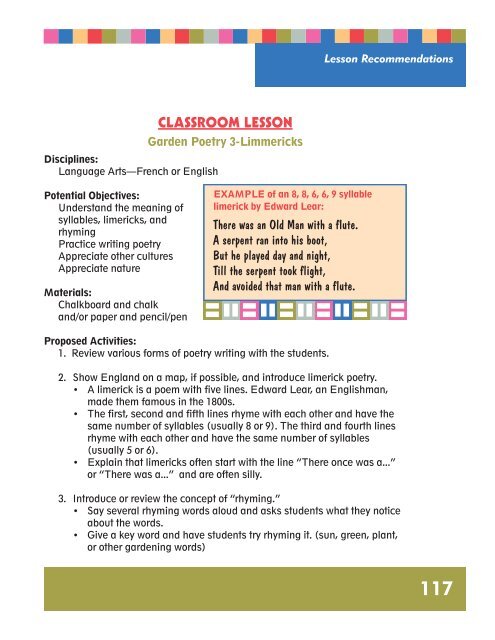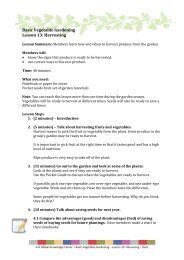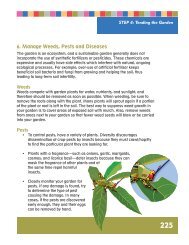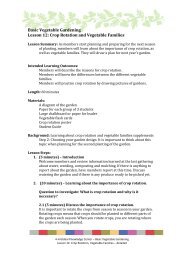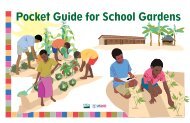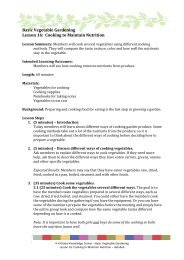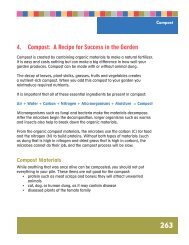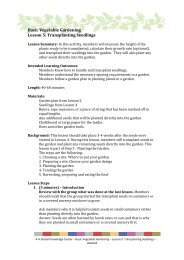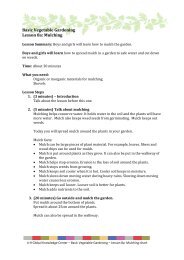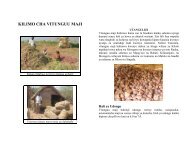Garden Poetry 3 â Limmericks - 4-H Africa Knowledge Center.
Garden Poetry 3 â Limmericks - 4-H Africa Knowledge Center.
Garden Poetry 3 â Limmericks - 4-H Africa Knowledge Center.
Create successful ePaper yourself
Turn your PDF publications into a flip-book with our unique Google optimized e-Paper software.
Lesson Recommendations<br />
Disciplines:<br />
Language Arts—French or English<br />
CLASSROOM LESSON<br />
<strong>Garden</strong> <strong>Poetry</strong> 3-<strong>Limmericks</strong><br />
Potential Objectives:<br />
Understand the meaning of<br />
syllables, limericks, and<br />
rhyming<br />
Practice writing poetry<br />
Appreciate other cultures<br />
Appreciate nature<br />
Materials:<br />
Chalkboard and chalk<br />
and/or paper and pencil/pen<br />
EXAMPLE of an 8, 8, 6, 6, 9 syllable<br />
limerick by Edward Lear:<br />
There was an Old Man with a flute.<br />
A serpent ran into his boot,<br />
But he played day and night,<br />
Till the serpent took flight,<br />
And avoided that man with a flute.<br />
Proposed Activities:<br />
1. Review various forms of poetry writing with the students.<br />
2. Show England on a map, if possible, and introduce limerick poetry.<br />
• A limerick is a poem with five lines. Edward Lear, an Englishman,<br />
made them famous in the 1800s.<br />
• The first, second and fifth lines rhyme with each other and have the<br />
same number of syllables (usually 8 or 9). The third and fourth lines<br />
rhyme with each other and have the same number of syllables<br />
(usually 5 or 6).<br />
• Explain that limericks often start with the line “There once was a...”<br />
or “There was a...” and are often silly.<br />
3. Introduce or review the concept of “rhyming.”<br />
• Say several rhyming words aloud and asks students what they notice<br />
about the words.<br />
• Give a key word and have students try rhyming it. (sun, green, plant,<br />
or other gardening words)<br />
117
Lesson Recommendations<br />
4. Ask students to write their own limerick poem about the garden.<br />
• Remind students to use descriptive language to make their poems<br />
more vibrant. Use this as an opportunity to present or review some<br />
grammar tips. For example, adjectives describe nouns; adverbs<br />
describe a verb, an adjective, or another adverb and often end in “ly.”<br />
• Have students find a semi-solitary place near the garden where they<br />
can relax, observe, and write.<br />
5. Have students share their limerick with groups of students or the entire<br />
class.<br />
Alternate Activities:<br />
1. Have students recite or perform these limericks at an educational event.<br />
2. Collect the students’ poems to make a book for the school library.<br />
3. Have students translate these limericks into a different language.<br />
4. Have students incorporate some words from another language into the<br />
limericks.<br />
Evaluation:<br />
Poem creation.<br />
Discussion and participation in the activity.<br />
118


